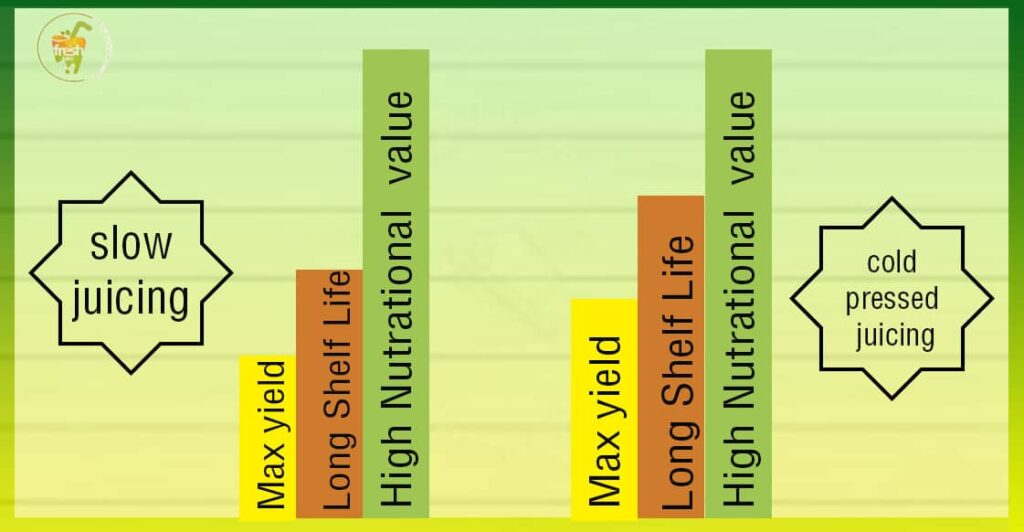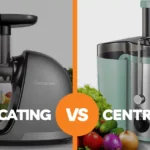Ever wondered what separates slow juicing from cold-pressed juicing? Know that juicing is not a novel idea, but it has become trendy recently to the point where the juice bar industry is flourishing. People are always looking for practical ways to enhance their health, and juicing has emerged as a trendy option thanks to its numerous vitamins and advantages.
Whether you’ve been juicing for a short or a long time, you might have occasionally pondered if leisurely juicing is equivalent to cold pressing.
We will delve deeper into this subject in this essay and see which juicing method of the extractor is the best juicer for celery.
Is Cold Pressing the Same as Slow Juicing?
Yes. “Slow juicing” and “cold pressing” apply to juicers that produce less heat than conventional juicers because they run at lower speeds.Both words refer to the lack of heat and oxidation that is believed to preserve the enzyme and nutrient content during the juicing process. Both know the same object of these titles. This juicer also goes by the term “Masticating Extractor.” These titles all denote the same concept.
Why Is It Named Cold or Slow Juicing?
The primary cause of the terms “slow juicing” and “cold press juicing” is the juicer’s sluggish working speed, which results in cold juice. Juicers with fast-spinning blades that chop produce at a high rate of speed and separate the flesh of the fruit or veggie from the liquid are typically used. It indicates that they generate heat during the process, which kills the fruit’s enzymes and reduces its nutritional content. The Centrifugal juicer is the name of this extractor.
On the other hand, a slow juicer, cold press juicer, or masticating juicer does not have a rotating blade; instead, it’s equipped with an auger which then masticates the produce in a manner similar to how we eat food with our molars. Due to the lack of heat production and preservation of the nutrients, the procedure produces cold liquid at a sluggish rate.

Is there a distinction between a slow juicer and a cold press juicer?
A sluggish juicer and a cold press blender are identical to one another. There may be some juicers with various mechanics that run at a sluggish pace. But due to how chilled and less frothy/anti-oxidized the liquid was made, they will also be classified as “cold pressed.”
Why should you be concerned with cold-pressed juice or slow juicing?
You only need to purchase a cold press blender if you’re a health-conscious individual wanting to include nutrient-dense juice. Because pasteurized drinks produced with centrifugal juicers are typically found in stores where you can purchase bottled juice, you can understand what we’re getting at.
And if you locate fresh cold-pressed juice, it will cost a lot of money to purchase it frequently. So purchasing a cold press extractor and creating this premium, enzyme-rich, nutritious juice yourself is the reasonable answer.
What advantages does cold-pressed juice have?
Following are the significances of cold pressed or slowed juicing:
- Cold press juice offers more nutrients than the products you put in the blender.
- Due to the abundance of minerals, cold pressing produces a highly concentrated liquid.
- In a cold press blender, less heat is produced, resulting in less oxidation, primarily responsible for destroying enzymes and minerals.
- You will extract more fruit juice from your fruits using the cold press technique, which improves productivity.
- Juicers are notorious for making a lot of commotion, but this one doesn’t. Juices from cold presses don’t create a lot of commotion because there aren’t any quickly spinning blades involved.

Finally-Is Cold-Pressed Juice Beneficial for You?
Cold-pressed juice has received a lot of praise, but is it healthy? It varies, is the brief response. Fruits and veggies are manually squeezed using a conventional press or machinery to create cold-pressed juice. This juicing technique retains more vitamins, minerals, and enzymes while using less sweetener and grease.
However, cold-pressed juice also has some drawbacks. One is that it might be challenging to locate stores that offer it, and if you do, the costs might be expensive. Furthermore, many people think that cold-pressed extract is not very hydrating, which, if taken frequently, could result in dehydrated skin or other problems.
Therefore, even though occasionally drinking cold-pressed juice may have some advantages, speaking with a doctor before making significant dietary adjustments is best.






